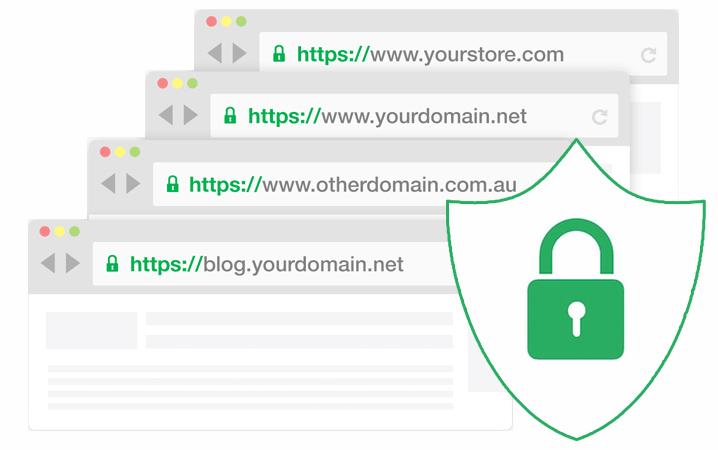what is a multi-domain (san) certificate and its benefits
A Multi-Domain Certificate, also known as a Subject Alternative Name (SAN) certificate, is a type of digital security certificate used to secure multiple domain names and subdomains under a single certificate. This is particularly useful for organizations or individuals managing multiple websites that share a common root domain.
Here are some key benefits of Multi-Domain (SAN) certificates:
- Cost-Effective: Instead of purchasing separate SSL/TLS certificates for each domain or subdomain, a SAN certificate allows you to secure multiple domains with a single certificate. This can result in cost savings, especially for organizations with numerous websites.
- Simplified Management: Managing multiple certificates for different domains can be cumbersome. A SAN certificate simplifies the management process by consolidating multiple domains under one certificate. This makes it easier to track expiration dates, renewals, and other administrative tasks.
- Enhanced Security: SSL/TLS certificates encrypt the communication between a user's browser and the server, providing a secure connection. With a SAN certificate, you can extend this security across multiple domains, ensuring that all communication is encrypted.
- Professional Image: Using a SAN certificate to secure multiple domains under a single certificate can enhance the professional image of your online presence. Visitors are more likely to trust websites that display a secure connection.
- Flexibility: SAN certificates are flexible and can be configured to secure a combination of fully qualified domain names (FQDNs), subdomains, and wildcard domains. This flexibility allows you to adapt the certificate to your specific needs.
- Compatibility: SAN certificates are widely supported by modern web browsers and servers, ensuring compatibility across different platforms. This makes them a reliable choice for securing diverse sets of domains.
- Future-Proofing: As your online presence grows and you add more domains or subdomains, a SAN certificate provides a scalable solution. You can add additional domains to the certificate without the need to purchase new certificates each time.
It's important to note that while SAN certificates offer these benefits, they may not be necessary for every website. For smaller websites or those with only one or a few domains, a standard SSL/TLS certificate might be sufficient. However, for organizations with multiple domains, subdomains, or complex web architectures, a Multi-Domain (SAN) certificate can be a valuable and efficient security solution.
Multi Domain SSL Key Features:
A Multi-Domain SSL (Secure Sockets Layer) certificate, also known as a Unified Communications Certificate (UCC) or Subject Alternative Name (SAN) certificate, is designed to secure multiple domain names under a single certificate. Here are key features of Multi-Domain SSL certificates:
- Securing Multiple Domains:The primary feature of Multi-Domain SSL certificates is their ability to secure multiple domain names with a single certificate. This includes the main domain and additional domains (subdomains or completely different domains).
- Subject Alternative Names (SANs):Multi-Domain SSL certificates use Subject Alternative Names to specify additional domain names that are covered by the certificate. Each SAN entry allows the certificate to be valid for a specific domain.
- Cost-Efficiency:Instead of purchasing individual SSL certificates for each domain, a Multi-Domain SSL certificate can cover several domains. This can be more cost-effective for organizations managing multiple websites.
- Wildcard Support:Some Multi-Domain SSL certificates support wildcard entries for subdomains. This means that a single entry like "*.yourdomain.com" can cover all subdomains under "yourdomain.com."
- Security and Encryption:Multi-Domain SSL certificates provide strong encryption, typically using 2048-bit key length and supporting modern cryptographic algorithms, ensuring a high level of security for data transmitted between the server and the client.
- Trust and Validation:Multi-Domain SSL certificates are issued by Certificate Authorities (CAs) after thorough validation of the requesting entity's ownership of the included domains. This validation helps establish trust with visitors to the secured websites.
- Easy Management:Simplifies certificate management by consolidating multiple domains into a single certificate. This can make tasks such as certificate renewal and installation more straightforward.
- Compatibility:Multi-Domain SSL certificates are compatible with most web browsers and devices, ensuring that users across different platforms can access secured websites without encountering certificate errors.
- Extended Validation (EV) Option:Some Multi-Domain SSL certificates offer Extended Validation, providing a higher level of assurance to website visitors by displaying a green address bar in supported browsers.
- Flexible Options:Multi-Domain SSL certificates often come with different validation levels, allowing businesses to choose the level of assurance that aligns with their security requirements.
When selecting a Multi-Domain SSL certificate, it's important to consider the number of domains you need to secure, the level of validation required, and any specific features such as wildcard support or extended validation.
